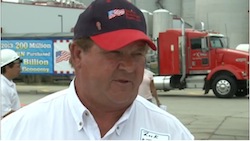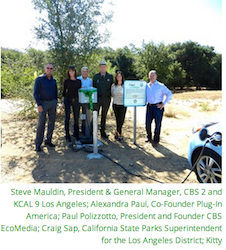Plug Power Inc. has been awarded a $650,000 contract from the U.S. Department of Energy (DOE) to demonstrate the use of hydrogen-based fuel cells to power the refrigeration units in semi-trailer trucks that transport perishable and frozen foods. The company was selected by the Fuel Cell Technologies Office within the DOE’s Office of Efficiency and Renewable Energy (EERE) to showcase its fuel cells in transport refrigeration
units (TRUs). These units are large air conditioners that regulate cold temperatures for ![]() items such as frozen pizza, fruits, vegetables, meats, dairy products and other goods that must be kept chilled or frozen during transport from distribution centers to retail destinations.
items such as frozen pizza, fruits, vegetables, meats, dairy products and other goods that must be kept chilled or frozen during transport from distribution centers to retail destinations.
According to Plug Power, the majority of the approximately 300,000 TRUs traversing U.S. highways are powered by diesel generators. Diesel is costly and produces environmentally hazardous particulate matter and nitrous oxide (NOx) emissions. A typical TRU will consume about 10 gallons of diesel per day, and emit roughly 101 kg of carbon dioxide (CO2).
By comparison, hydrogen-powered fuel cells emit only a small amount of heat and water, making them an environmentally friendly alternative energy source. Fuel cells operate more efficiently, cleanly and quietly, at lower cost than diesel. In addition, Plug Power says its customers that use hydrogen fuel cells to power material handling forklift trucks will benefit from deployment of fuel cells in their TRUs, by leveraging the hydrogen infrastructure already in place. Increased on-site hydrogen consumption would result in lower fuel expenses overall, due to economies of scale.
“Plug Power’s leadership in the material transport industry is generating interest and development funds for implementation of fuel cells in adjacent markets,” said Andy Marsh, CEO of Plug Power. “This TRU award demonstrates how Plug Power is now executing on its market expansion strategy to architect fuel cell solutions across a wider range of opportunities.”
Plug Power’s TRU fuel cells, which will be based on its GenDrive technology, will cool Carrier Transicold refrigeration units on trailers delivering products for a Sysco Corp. distribution center on Long Island in New York. Each TRU will run for a minimum of 400 hours over the two-year contract period. Hydrogen will be supplied by Air Products. Researchers at the Pacific Northwest National Laboratory (PNNL), a contractor that manages government programs for the DOE, will oversee the program.



![IMG_0481[2]](http://energy.agwired.com/wp-content/uploads/sites/11/2013/08/IMG_04812-300x225.jpg)






